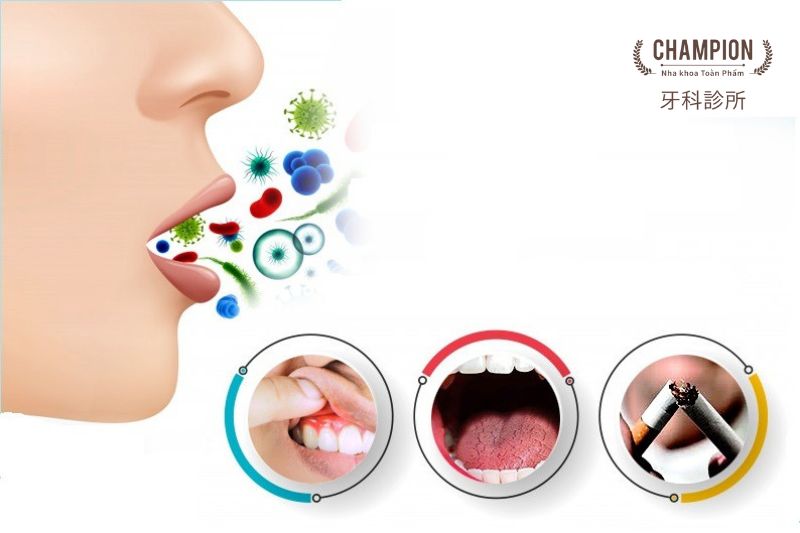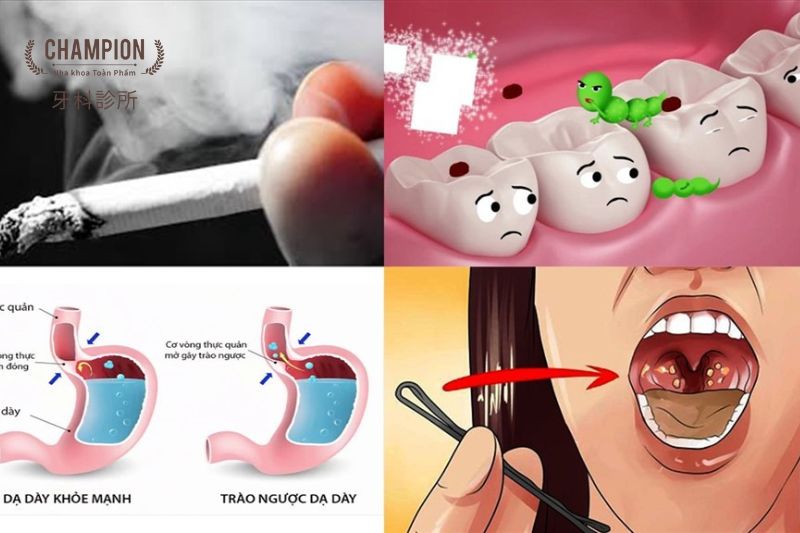Bad breath is a very common condition that can affect anyone at any age. Not only does bad breath cause discomfort to the sufferer, but it can also impact their social relationships. In this article, Champion Dental Clinic will discuss some common causes of bad breath and effective prevention methods.
What is Bad Breath?
Bad breath, also known as Halitosis, is a common health phenomenon affecting about 40% of the population. It is not a medically dangerous condition, but it has a negative impact on the social life and psychology of those affected.
Bad breath is characterized by an unpleasant odor from the breath. The main cause of this condition is the decomposition of food in the mouth by bacteria, producing volatile sulfur compounds.

A Compilation of Common Causes of Bad Breath
Bad breath can be due to many causes, including both internal and external factors of the body.
Internal Causes of Bad Breath
- Oral diseases: This is the most common cause of bad breath. Oral diseases may include tooth decay, gum inflammation, periodontitis, gingivitis, etc. When these diseases occur, bacteria accumulate and grow in the oral cavity, producing foul-smelling substances.
- Digestive system diseases: Some gastrointestinal diseases can cause bad breath, including gastroesophageal reflux, gastritis, enteritis, etc. These diseases can cause food to reflux into the esophagus, leading to bad breath.
- Respiratory tract diseases: Some respiratory diseases can cause bad breath, including sinusitis, pharyngitis, tonsillitis, etc. These diseases can lead to mucus accumulation in the oral cavity, causing bad breath.
- Systemic diseases: Some systemic diseases can cause bad breath, including diabetes, liver failure, kidney failure, etc. These diseases can lead to the accumulation of metabolic substances in the body, causing bad breath.

External Causes of Bad Breath
- Poor oral hygiene: Poor oral hygiene is the most common external cause of bad breath. When dental hygiene is not maintained, plaque and leftover food accumulate on teeth, gums, and the tongue, creating conditions for bacterial growth and bad breath.
- Smoking: Smoking is a common cause of bad breath. Harmful substances in cigarette smoke adhere to teeth, gums, and the tongue, causing irritation and increasing the production of foul-smelling substances.
- Alcohol consumption: Drinking alcohol can also cause bad breath. Alcohol can dry out the mouth, allowing bacteria in the mouth to thrive and cause bad breath.
- Eating smelly foods: Some foods with strong odors, such as garlic, onions, chili, etc., can cause bad breath.
- Using certain medications: Some medications can cause dry mouth, allowing bacteria in the mouth to thrive and cause bad breath.

>> See more: Effective and Safe Methods for Treating Root Canal Inflammation
How to Determine if You Have Bad Breath?
Bad breath not only causes inconvenience in daily communication but can also be a sign of serious health problems. Here are two main ways to help you determine if you have bad breath.
Self-Check
- Hand test: Hold your hand up to your mouth, breathe out, and smell. If you detect an unpleasant odor, you may have a bad breath problem.
- Dental floss test: Smell the dental floss after using it, as it can be a good way to check for bad breath.
- Asking those around you: Another way to test is to ask friends or family members for their honest feedback on your breath odor.
Using Medical Devices
For cases where self-checking does not yield accurate results, using medical devices is the best option.
- Halimeter: This specialized device is used in medical facilities to test breath odor. A Halimeter can analyze volatile organic compounds in the breath, thereby determining the level and cause of bad breath.
- Professional evaluation: At dental clinics or medical facilities, doctors can use a Halimeter along with clinical evaluation to accurately determine your bad breath condition.

Quick Remedies for Bad Breath
To address bad breath, it's necessary to identify the cause. If it's due to oral, digestive, respiratory, or systemic diseases, medical consultation and timely treatment are needed. If bad breath is due to poor oral hygiene, smoking, alcohol consumption, eating smelly foods, or using certain medications, the following measures can be applied:
- Proper oral hygiene: Brush your teeth at least twice a day for 2 minutes each time. Use dental floss at least once a day to remove leftover food and plaque between teeth. Clean your tongue at least once a day to remove plaque and bacteria.
- Limit smoking and alcohol consumption: Smoking and drinking alcohol can increase the risk of oral diseases and cause bad breath.
- Drink plenty of water: Drinking water helps keep the mouth moist, preventing dry mouth and helping to remove bacteria.
- Use odor-neutralizing oral care products: Use odor-neutralizing dental care products such as toothpaste, mouthwash containing ingredients like baking soda, peppermint oil, etc.
If bad breath does not improve despite these measures, consult a doctor for more thorough advice and examination.
Conclusion
Bad breath not only affects confidence and daily communication but can also be a sign of serious health issues. Understanding the causes of bad breath and applying timely preventive and treatment measures will help you control this condition. Do not hesitate to seek the opinion of a doctor or dentist if you are concerned about bad breath.
Vietnamese & English: (028) 5411-2295
中文: (028) 5411-2297 172 Nguyen Luong Bang, Tan Phu Ward, District 7, Ho Chi Minh City.
Fanpage: Champion Dental Clinic 牙科診所
Zalo: Champion Dental Clinic
Youtube: Champion Dental Clinic 牙科診所
 Champion Dental Clinic
Champion Dental Clinic



